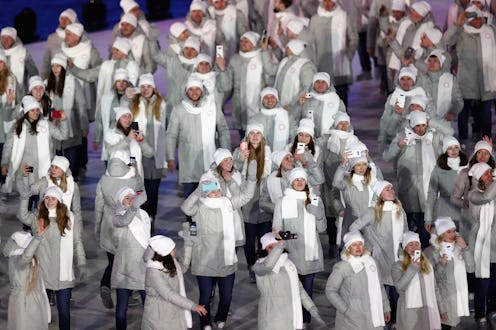News
Nope, You're Not Going To See The Russian Flag At The Closing Ceremony — Here's Why

If you were hoping to see Russia march in the 2018 Winter Olympics closing ceremony... Well, don't hold your breath. In a unanimous vote Saturday, the International Olympic Committee (IOC) opted to continue Russia's Olympic ban into the closing ceremony. The IOC's decision means that Russian athletes who competed in PyeongChang as part of the neutral delegation known as the Olympic Athletes From Russia, or OAR, won't be able to march under the Russian flag during the Games' closing ceremony on Sunday.
In a statement released after the vote, the IOC said it would have considered lifting then ban on Russia as the OAR delegation appeared to have "respected" the committee's initial suspension. "However, two Olympic Athletes from Russia failed doping tests here in PyeongChang," the IOC said. "This was hugely disappointing and, in addition to other considerations, prevented the IOC from even considering lifting the suspension for the closing ceremony."
Earlier this week, OAR curler Aleksandr Krushelnitcky was stripped of the bronze medal he'd earned in curling's mixed doubles after reportedly testing positive for the banned substance meldonium, according to the San Diego Tribune. On Saturday, it was announced OAR bobsledder Nadezhda Sergeyeva had failed a doping test after testing positive for trimetazidine, a metabolic agent that can increase coronary flow reserve.
But Shamil Tarpischev, an IOC member from Russia, argued the two failed tests were isolated incidents and that the OAR delegation had met all of the IOC's requirements overall. "The two doping cases account for the lack of culture and education [of the individuals]. They are isolated," Radio Free Europe reported Tarpischev said.
The IOC's vote to uphold the Olympic ban on Russia reportedly followed a recommendation from the committee's executive board to keep the country's suspension in place. Traditionally, Olympic athletes compete under the flag of their respective country, meaning those who medal earn both individual glory and bragging rights for their country.
This year, however, a total of 169 Russian athletes competed under the OAR identifier and a neutral flag featuring the Olympic rings as Russia was officially barred from the Games for an alleged state-sponsored doping scheme. Although Russia has denied the allegations, the IOC moved to ban the country from participating in the 2018 Games after an investigation by the World Anti-Doping Agency found evidence Russia had tampered with urine samples in an effort to cover up the use of illegal, performance-enhancing drugs by their athletes.
In essence, those competing under the OAR identifier aren't officially considered Russian athletes but rather a group of individual athletes who just so happen to all be Russian. The ban means OAR athletes are prohibited from singing the Russian national anthem, wearing Russia's national colors, displaying the Russian flag, or referring to themselves by anything other than OAR while at the Olympics. OAR athletes are also barred from posting or retweeting any national symbols related to Russia on social media while competing in the Games, according to Olympic conduct guidelines. "Failure of a member of the OAR delegation to comply with existing rules or these guidelines may lead to an OAR invitation being revoked and/or the withdrawal of accreditation," the guidelines state.
While the Olympics closing ceremony doesn't feature a Parade of Nations in quite the same way the Games opening ceremony does — instead of marching in alphabetical order athletes walk in all together in a symbol of unity — each country's flag is traditionally still present. However, under the IOC's latest vote it seems the 2018 Winter Olympics will end with Russia still sidelined.